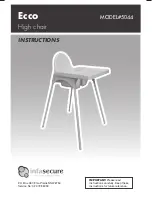
33
ROUNDABOUT Guía de Usuario
4. Sistema retráctil de bloqueo en caso de emergencia con
hebilla deslizante
a. Dispone de una hebilla
que se puede deslizar
a lo largo del cinturón
de seguridad del
vehículo.
b. Tiene un sistema
retráctil que se bloquea
solo en caso de
emergencia, es decir,
en caso de parada
repentina o de choque.
IMPORTANTE:
Este tipo de cinturón requiere el uso
de seguros integrados en el asiento, tanto en asientos
orientados hacia delante como hacia detrás. Consulte la
página 24 para obtener más información sobre cómo utilizar
los seguros.
Cinturones
con banda
horizontal y
transversal
inflables
Hebilla
5. Sistema retráctil intercambiable con hebilla cosida al tejido
con cinturones inflables
NOTA:
Este asiento de seguridad de niño BRITAX puede
o no puede ser compatible con cada cinturon inflable.
Consulta las FAQs (preguntas más frequentes) en la
seccion de suporte del sitio de web de BRITAX (www.
britaxusa.com/support) por más informacion.
a. Tiene hebilla cosida al
tejido.
b. Viene equipado con un
sistema retráctil que
puede configurarse
para funcionar
como un sistema
retráctil de bloqueo
automático. Para
activar la función de
bloqueo automático,
es necesario
extraer el cinturón
completamente del
sistema retráctil
NOTA:
Para utilizar un
asiento de seguridad
para niños con este tipo
de cinturón de seguridad,
debe cambiar el sistema
retractil por el cinturón de
banda horizontal al modo
de sistema bloqueo
automático.
Roundabout G4_1.indb 33
9/23/2014 8:44:08 AM












































